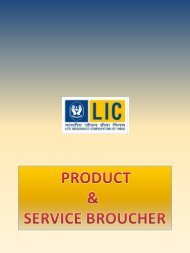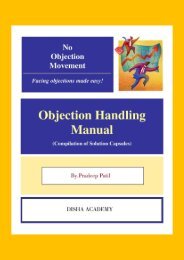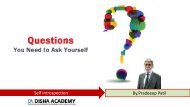INDIAN TRUST ACT 1882 BY.PRADEEP PATIL
UNDERSTANDING TRUST IN NOW A DAYS IMPORTANT FOR MARKETING FORCE OF LIFE INSURANCE
UNDERSTANDING TRUST IN NOW A DAYS IMPORTANT FOR MARKETING FORCE OF LIFE INSURANCE
Create successful ePaper yourself
Turn your PDF publications into a flip-book with our unique Google optimized e-Paper software.
The person who reposes or declares the confidence is called the "author of the trust"; the<br />
person who accepts thee confidence is called the "trustee"; the person for whose benefit the<br />
confidence is accepted is called the "beneficiary"; the person for whose benefit the confidence is<br />
accepted is called the "beneficiary"; the subject-matter of the trust is called "trust-property" or<br />
"trust-money"; the "beneficial interest" or "interest" of the beneficiary is his right against the<br />
trustee as owner of the trust-property; and the instrument, if any, by which the trust is declared is<br />
called the "instrument of trust";<br />
A breach of any duty imposed on a trustee, as such, by any law for the time being in force, is<br />
called a "breach of trust";<br />
And in this Act, unless there be something repugnant in the subject or context, "registered"<br />
means registered under the law for the registration of documents for the time being in force; a<br />
person is said to have "notice of a fact either when he actually knows that fact, or when,, but for<br />
willful abstention from inquiry or gross negligence, he would have known it, or when<br />
information of the fact is given to or obtained by his agent, under thee circumstances mentioned<br />
in the Indian Contract Act,1872, Section 229; an all expressions used herein and defined in the<br />
Indian Contract Act,1872, shall be deemed to have the meanings respectively attributed to them<br />
by that Act.<br />
English and Indian Law - A trust according to this Act must be an obligation annexed to the<br />
ownership of property. According to the English Law, a trust is also annexed in privately to the<br />
estate, i.e., must stand or fall with the interest of the persons by whom the trust is created. (See<br />
Riddle on Trusts, 13th Ed., pp. 13-15).<br />
CHAPTER II - OF THE CREATION OF <strong>TRUST</strong>S<br />
4. Lawful purpose - A trust may be created for any lawful purpose. The purpose of a trust is<br />
lawful unless it is (a) forbidden by law, or (b) is of such a nature that, if permitted, it would<br />
defeat the provisions of any law, or (c) is fraudulent, or (d) involves or implies injury The Orient<br />
Tavern the person or property of another, or (e) the Court regards it as immoral or opposed to<br />
public policy.<br />
Every trust of which the purpose is unlawful is void. And where a trust is created for two<br />
purposes, of which one is lawful and the other unlawful, and the two purposes cannot be<br />
separated, the whole trust is void.<br />
Explanation - In this section the expression "law" includes, where the trust property is<br />
immovable and situate in a foreign country, the law of such country.<br />
Illustrations<br />
A conveys property to B in trust to apply the profits to the nature of female foundlings to be<br />
trained up as prostitutes. The trust is void.


















